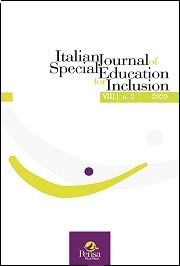Verso una “jazzing society”? L’improvvisazione come “capability” nell’educazione inclusiva
DOI:
https://doi.org/10.7346/sipes-02-2020-01Abstract
As Community we have a duty to provide children with a set of capabilities enabling them to adapt to an increasingly diversified and complex environment, in which creativity, ability to innovate, entrepreneurship and a commitment to continue learning are just as important as the specific knowledge (EU 2008). Most of all, what seems to be crucial in our “globalized era” is the persons’ capability to re-invent continuously their “local” functionings toward aflourishing of polyphonic inclusive model communities. Starting from the metaphor of “education as jazz” already explored in a recent book (Santi & Zorzi, 2016), eight “jazzy” ways to escape the monological tradition of teaching and learning in education are proposed, assuming the ephemeral and fleeting concept of improvisation as skeleton of curriculum design and very provoking tool to face the challenge of educating capabilities. In order to translate improvisation into a capability we captured its main feature in a possible profile, with a set of components (processual attitudes, procedural skills, and productive knowledge), considered as ex-aptive functionings useful to transform each moment in our life as an opportunity to live better. A study is presented in which qualitative methodology was adopted to explore if and how improvisation could be considered as an emergent and evolutive human capability for a flourishing development of better societies. During an exploratory phase (Santi, Zorzi 2014), 10 professional experts in improvisation were chosen as witnesses to inquire phenomenologically how improvisation can be considered a capability in creative processes.


